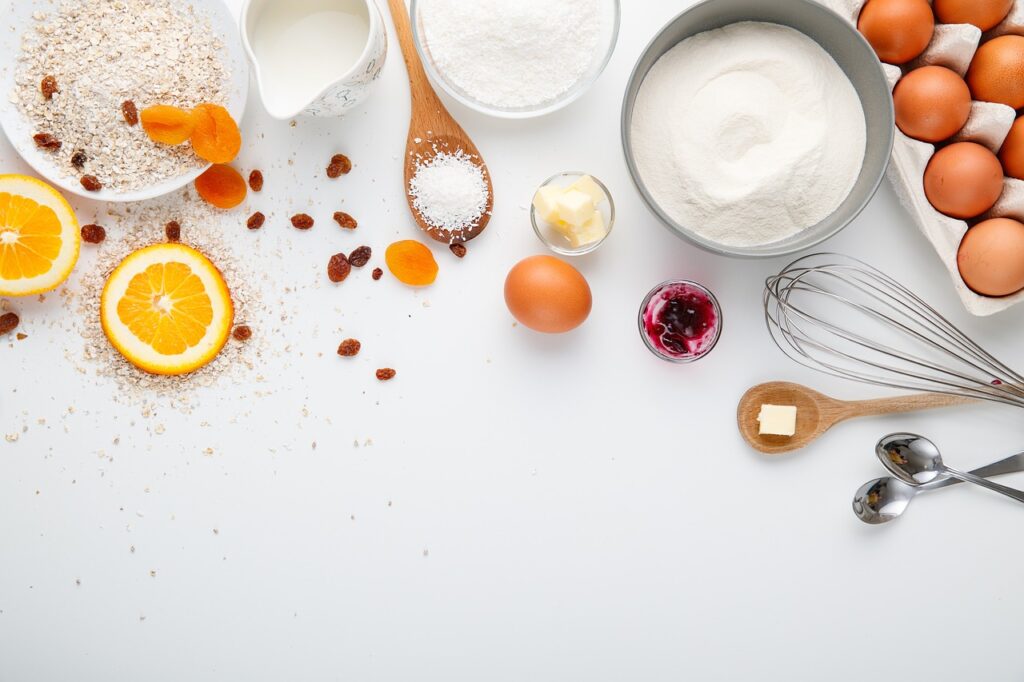Baking is a fun and rewarding activity, but not as a beginner. With so many techniques and recipes on internet you can get confused and can easily get lost. Don’t worry—this guide is here to simplify things. Some easy and practical tips are here to help beginner bakers create delicious treats and enjoy the process.
Start with Easy Recipes
Start with simple and build your confidence first. Jumping into complex recipes like croissants or macarons isn’t the best idea for beginners. Begin with simpler recipes such as cookies, muffins, or a basic sponge cake. These are easier to follow and allow you to learn essential baking techniques without stress.
Read the Recipe Carefully
Before baking, read the recipe from start to finish. Understand each step so you don’t miss important instructions like preheating the oven, softening butter or egg beating. Baking requires precision, and skipping steps could ruin your results. Do not mix teaspoons with tablespoons.
Get the Right Baking Tools
Invest in a few must-have baking tools to make the process easier. Buy measuring cups and spoons because precision is important for baking, mixing bowls, spatula, baking pans for cakes, cup cakes, pizzas etc, electric beater for uniform texture of better and for foamy mixture of eggs.
Measure Ingredients Properly
Baking is a science, so precise measurements are crucial. Use measuring cups for dry ingredients and a liquid measuring cup for wet ones. Avoid guessing amounts, as even small mistakes can affect the texture and flavor of your bake.
Always Preheat the Oven
Preheating the oven is a key step. An oven that is not hot enough can cause uneven baking or flat cakes. Use an oven thermometer to ensure your oven reaches the right temperature. OTG ovens are best for baking.
Understand the Ingredients
Each ingredient has a purpose:
Flour provides structure for baking, Sugar/brown sugar adds sweetness and helps with browning, eggs Bind the ingredients and add moisture. Butter or Oil contributes to flavor and tenderness.
Knowing this helps you troubleshoot or make substitutions when needed.
Use Room-Temperature Ingredients
Most recipes work best when ingredients like butter, eggs, and milk are at room temperature. They mix more easily and create smoother batters. If you’re in a hurry, place eggs in warm water for a few minutes or soften butter in the microwave on low heat to obtain room temperature. Do not heat them up because it can ruin your recipe.
Mix Batter Gently
Overmixing can make baked goods dense and chewy. Once you add flour, mix just until the ingredients are combined. It’s okay if there are small lumps in the batter for muffins or pancakes. Adding flour in portions can be a good practice.
Line Pans with Parchment Paper
Parchment paper or butter paper makes it easier to remove baked goods from pans so that you can easily clean your pans. Use it for cookies, cakes, and brownies to avoid sticking.
Check for Doneness Properly
Timing is important, but ovens can vary. Use these tricks:
For cakes, Insert a toothpick in the center. If it comes out clean, it’s done. Do not check again and again because it could imbalance oven’s inner temperature.
For cookies, They should look set but still soft in the middle. They will firm up as they cool.
Let Baked Goods Cool Completely
Cooling is an essential part of baking. Let cakes cool in the pan for 10-15 minutes before transferring to a rack. Cookies should sit on the baking sheet for a few minutes to firm up before moving them.
Experiment Gradually
Once you’re comfortable with basic recipes, try experimenting more. Add vanilla extract, lemon zest, or cinnamon to enhance flavors. Experiment one step at a time to understand how changes affect the outcome.
Learn from Mistakes
Mistakes are part of the process. If your cake sinks or cookies burn, figure out what went wrong. Maybe the oven was too hot, or you measured incorrectly. Each error is an opportunity to improve.
Store Ingredients the Right Way
Fresh ingredients are key to great baking. Keep flour in airtight containers, store butter and eggs in the fridge, and avoid using expired leavening agents like baking powder or soda.
Watch Tutorials or Take Classes
Online tutorials or beginner-friendly baking classes can teach techniques and tips that are hard to learn from recipes alone. Watching professionals helps you understand what to expect.
Start with Small Batches
When experimenting with a new recipe, make smaller portions to reduce waste. This way, if the result is not perfect, you will not feel like you’ve wasted too many ingredients.
Use Quality Ingredients
High-quality ingredients improve the taste of your baked goods. Use real vanilla extract instead of imitation and choose good-quality chocolate or butter. These small upgrades make a big difference.
Enjoy the Process
Baking is not just about the end product, it’s about the experience. Enjoy mixing, decorating, and even the aromas from your oven. Baking can be satisfying, so feel and enjoy every moment.
Final Thoughts
Baking as a beginner can be stressing, but with these tips, you’ll feel more confident in no time. Start with simple recipes, follow instructions carefully, and most importantly, have fun. As you practice, your skills will improve, and you’ll soon be ready to tackle more challenging bakes.
What’s the first recipe you plan to try? Let us know in the comments!



